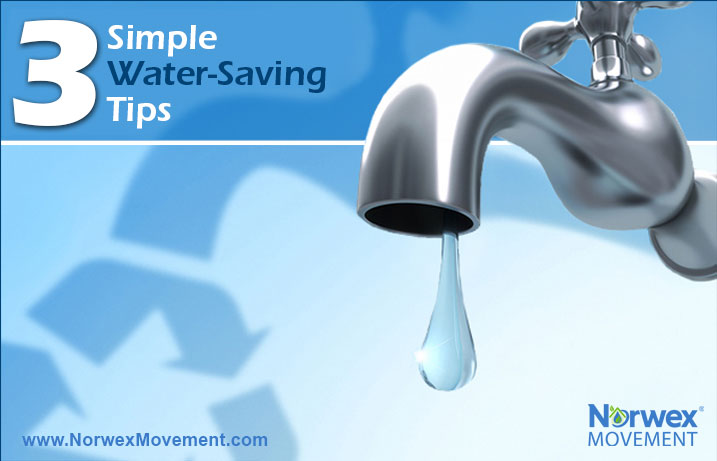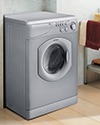

Although many of us have constant access to clean, safe water, it’s something we often take for granted. With an increase in severe droughts in the U.S., as well as Europe, Asia and other locations around the world, practicing water conservation is becoming a necessity.
The Environmental Protection Agency (EPA) reports that the average American family of four uses roughly 400 gallons of water a day, while according to Water.org, 750 million people (approximately 1 in 9 people) around the world do not have access to safe water.
Fresh water resources may seem inexhaustible to many of us, but only about 1% of the world’s water is actually fresh water. With this in mind, it’s easy to see why water conservation is so important.
Here are a few tips for reducing water consumption at home:
 1. Turn your faucets off
1. Turn your faucets off
Whether you’re rinsing dishes, brushing your teeth or washing your face, it’s important to break the habit of leaving your faucet running during these activities.
According to the EPA, bathroom faucets use about two gallons of water every minute that they’re left running. So remember to turn your faucets off while you go about your daily water-related routines, and you can help save hundreds of gallons of water per month.
![]()
Helpful tip: Make sure to fix your leaky faucets. Just one continuously dripping faucet can waste up to 20 gallons of water per day—or 7,300 gallons of wasted water a year!
 2. Take shorter showers
2. Take shorter showers
Taking a shower in the morning can be the perfect way to wake up, and in the evening, it’s an amazing way to relax after a long day. Unfortunately, showering accounts for almost 17 percent of household indoor water use—roughly 40 gallons of water per day for the average family of four, not to mention the amount of energy required to heat and transport the water to your shower.
![]()
Helpful tip: Every minute that you spend in the shower uses approximately 2.5 gallons of water (for a standard showerhead). The average shower is a little over eight minutes long (according to the EPA), which averages to be about 20 gallons of water per family member. Try timing yourself in the shower with a kitchen or mobile phone timer set for 5 minutes (or less). By getting used to shorter showers, you can help conserve a great deal of water and energy.
 3. Wash your clothes more efficiently
3. Wash your clothes more efficiently
According to Energystar.gov, the average American family washes about 300 loads of laundry each year, which accounts for more than 20 percent of residential indoor water use.
If you’re using a front-loading washing machine, you’re using roughly 20 gallons of water per load, and if you’re using a top-loading washing machine, that amount could be doubled.
![]()
Helpful tip:
To save on water and energy, wash your clothes in full loads only and use cold water whenever possible. If you’re in the market for a new washer, look for an Energy Star–certified washer, as they can use up to 40 percent less water than standard washing machines.
By making these simple eco-friendly adjustments in your household, you can save an enormous amount of water and energy every year, all while helping the environment!
Resources:
Forbes: 11 Ways To Save Water At Home
DrinkTap: Questions about tap water answered
Washington Post: Shower Waste Solutions
EPA: Shower Better
Global Drought Information System
It seems that more often than not we are asked to decrease or conserve water, but while watching a recent documentary, it was made very clear to me that the water footprint has far more challenges than simply our water usage. The global impact of animal agriculture seems to have what could be the largest impact. Animal Ag impacts air quality, climate change and as we talk about water, the impact from animal ag include water pollution and excessive water consumption. I believe that if we are to impact water conservation, it may require we eat less meat. That would truly impact our globe. 🙂
I am gradually converting over to a vegan diet as my part to conserve water and reduce animal agriculture pollution.
These are great tips, especially as we continue to navigate the drought here in Cali. Our small choices and habits can make a big impact.
During the heatwave/drought of 1976 here in the UK (see it doesn’t rain all of the time!), we were advised to put a house brick in the toilet cistern to use less water when flushing the toilet, also to use the rhyme ‘ if it’s yellow let it mellow, if it’s brown, flush it down!’
Linda, I remember that rhyme too! And thanks for the tip about using a brick to save water–great idea!
I save leftover drinking water from meals/cooking and fill an old gallon milk jug with this water. I then use the water for my garden, flowers, or compost pile. I don’t like to waste a drop!
Thanks for the reminders! I love how it’s easy to shower quicker with our body cloths since I don’t need soap I don’t need to “rinse” as long. I also try to turn off the water while I shampoo my hair.
We use a dehumidifier and use the collected water to water our plants.
When kids sports bottles come up partially full, I use them to water my indoor plants. We also have a rain barrel to catch water for our outdoor gardens. I have only had to use the hose water twice this summer so far. 😉
I pour the water from my dehumidifier into a watering can to water my gsrden. Can’t just throw it away!
I wash my hair and get wet in the shower then turn it way down to a trickle while I condition my hair and wash and shave. Then turn it back on fully to rinse. It’s not a lot but it’s something. Plus it conserves energy to heat the water. I always keep it off while brushing my teeth too. And I try to use it sparingly in the kitchen.
Other than chicken, I eat very little red meat or pork.
I collect the water that we run while waiting for hot water and use on plants.
I do all 3 of these. My new washer I notice a difference on my water bill!
We are taking steps to conserve water in California with all our drought issues.. I actually KNOW people whose wells have run out of water and whose public water has been rationed! It’s insane!
I wash with cold water and Norwex detergent. My clothes always get clean. I don’t need to run a second rinse. I wear pants and sweaters several times before washing them unless they are dirty the first time. I wear an apron when baking and cooking to protect my clothing from spills.
If you have young children put the plug in when you shower. Use Norwex microfiber cloths. There won’t be a soapy film in your tub and the water will be clean unless you have been doing some very dirty work. When you are done there will be a tub of clean water to bathe your child(ren) in. Bathe children together until the need for modesty and privacy no longer allows for that. If you don’t have kids then soak in a tub of epsom salts and essential oils for some relaxation time.